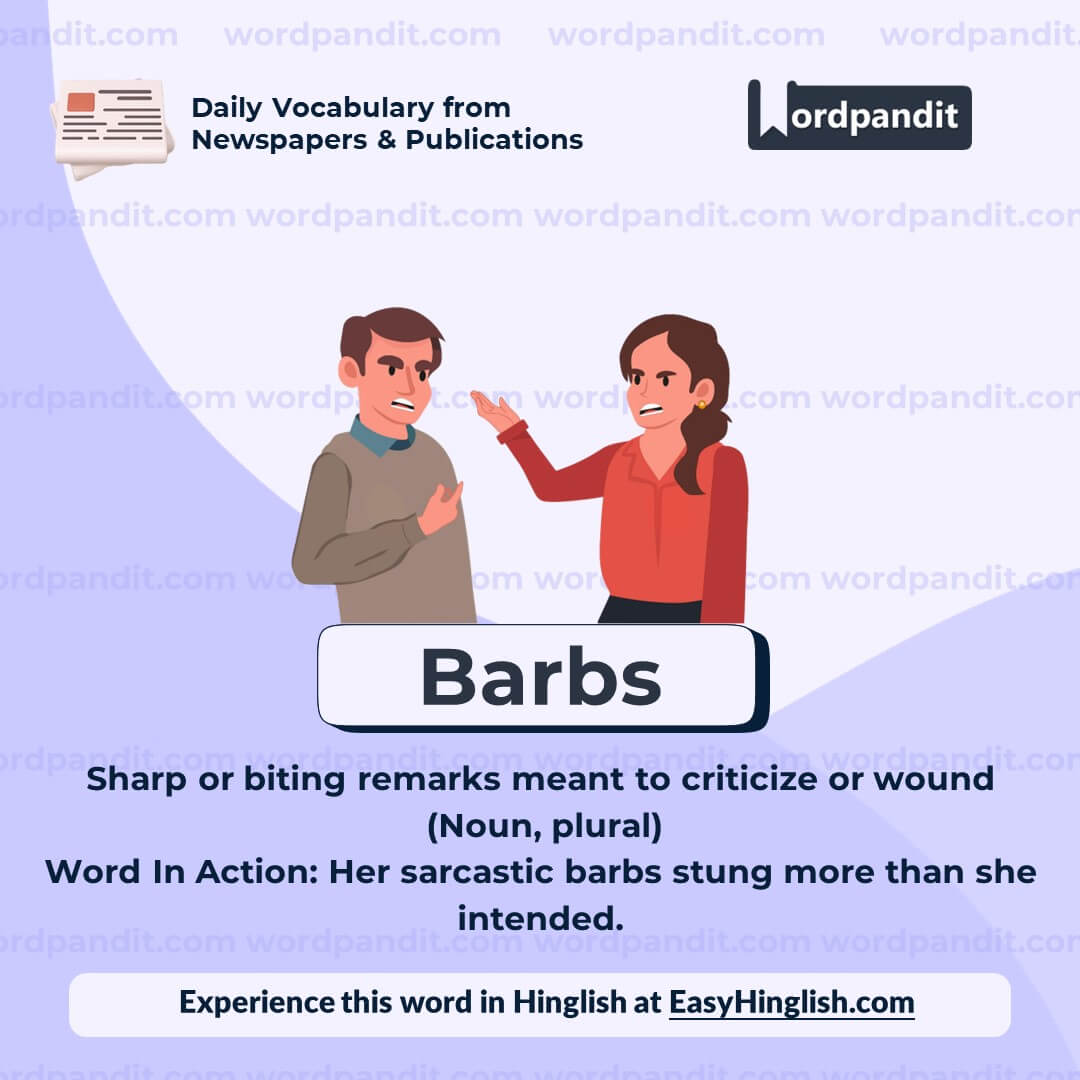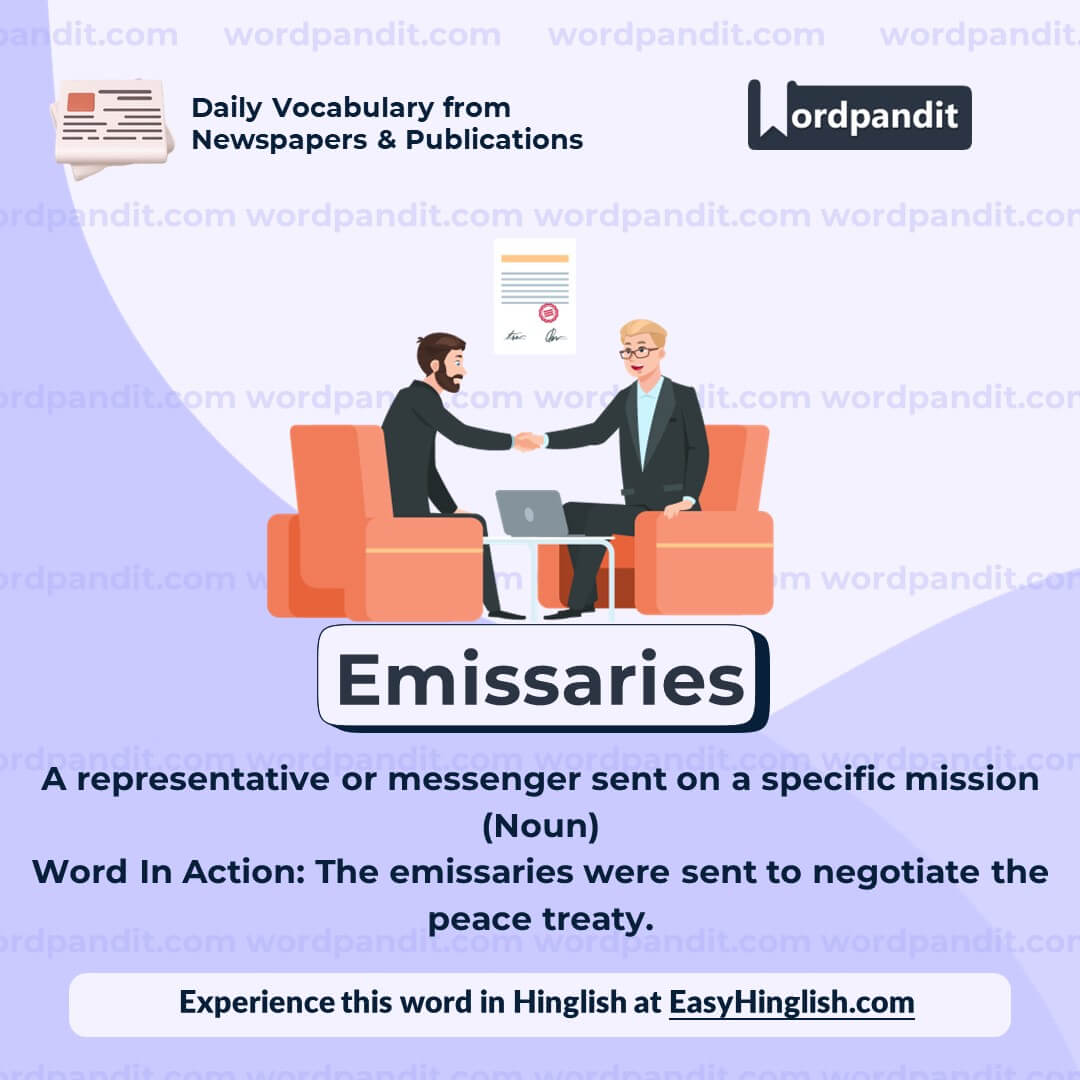Daily Vocabulary from Indian Newspapers and Publications
Welcome to Wordpandit’s Indian Vocabulary Hub
At Wordpandit, we understand the importance of staying rooted in the local context while expanding your language skills. This section focuses on enriching your vocabulary with words and phrases drawn from India’s leading newspapers and publications, ensuring you're learning vocabulary that is practical, relevant, and uniquely Indian.
Why Indian Sources Matter
We believe that the best way to master any language is by immersing yourself in local content. That’s why we carefully curate vocabulary from top Indian publications, including:
- The Hindu
- The Times of India
- The Economic Times
- Hindustan Times
- Live Mint
- The Indian Express
- And many others...
Stay Updated, Stay Relevant
With daily updates from Indian news sources, you’ll be consistently learning words that reflect the trends and shifts in Indian society and culture. Our focus is to provide vocabulary that enhances your understanding of the language in an Indian context.
How Wordpandit Supports Your Goals
Whether you’re preparing for exams, aiming to improve your professional communication, or simply want to stay connected with the latest Indian vocabulary, Wordpandit is here to guide you every step of the way.
Learn with a Practical Approach
Our interactive learning methodology includes real-world examples, engaging activities, and context-specific usage to ensure that every word becomes part of your active vocabulary.
Dive into Indian Vocabulary Today!
Why Choose Wordpandit?
Practical Learning: Focus on words you'll actually encounter in real-world reading, enhancing your comprehension and communication skills.
Diverse Content: From current affairs to scientific breakthroughs, our varied sources expose you to vocabulary across multiple domains.
Effortless Integration: Make Wordpandit a part of your daily routine. Just a few minutes each day can significantly boost your lexicon over time.
Your Path to Vocabulary Mastery
- Visit our Daily Vocabulary section regularly
- Explore new words and their usage in context
- Practice incorporating these words into your own writing and speech
- Track your progress as your vocabulary expands
Start Your Journey Today
Embark on your vocabulary enhancement journey with Wordpandit. By consistently engaging with our daily posts, you'll build a robust vocabulary that serves you well in academic, professional, and personal contexts.
Remember, a word a day keeps linguistic limitations at bay. Make Wordpandit your daily companion in the quest for vocabulary excellence!
WORD-1: Coir
Context:
"Like others, Savarkar was subjected to them—solitary confinement, to stand for a week with handcuffs; chain-fetters; crossbar fetters . . . ‘work’, diabolically designed to break the prisoner—pounding coir, extracting oil as the bullock does by pushing the shaft round and round the ‘oil mill’ to the point one fainted yoked to the ‘mill’." - The Wire
Explanatory Paragraph:
Coir is a natural fiber obtained from the husk of a coconut. It is rough and durable, often used for making ropes, mats, brushes, and other products. In historical contexts, coir work was a form of hard labor imposed on prisoners, requiring them to pound or weave the tough fibers, which was both physically exhausting and mentally grueling.
Meaning: A coarse fiber from the husk of a coconut, used in making ropes and mats. (Noun)
Pronunciation: Koy-er
Difficulty Level: ⭐⭐ (Basic to Intermediate)
Etymology: Derived from the Malayalam word *kayar*, meaning "cord" or "rope," coir has been used for centuries in maritime and household applications.
Synonyms & Antonyms:
Synonyms: Coconut fiber, husk fiber, palm fiber
Antonyms: Synthetic fiber, silk, wool
Usage Examples:
- The fishermen used coir ropes to tie their boats securely to the dock.
- She bought a durable coir doormat to withstand the monsoon rains.
- In colonial prisons, convicts were forced to weave coir mats as punishment.
- Eco-friendly packaging now includes coir as a sustainable alternative to plastic.
Cultural Reference:
"Coir has been an integral part of the Indian economy for centuries, especially in Kerala and Tamil Nadu, where it is a major cottage industry." - Indian Handicrafts Journal
Think About It:
How has the use of natural fibers like coir evolved from being a colonial labor tool to a sustainable product in today’s world?
Quick Activity:
Look around your house and identify any items made from coir. If you don’t find any, research how coir is used in modern eco-friendly products.
Memory Tip:
Think of "coir" as "coconut hair" since it comes from the husk of a coconut and has a similar rough texture.
Real-World Application:
Coir is widely used in making biodegradable mats, ropes, brushes, and even soil erosion control products, promoting sustainability in various industries.
WORD-2: Barbs
Context:
"With Congress fielding barbs from partners in INDIA bloc on Delhi elections results, where many have accused it of contributing to the BJP’s victory, senior Congress leader Manickam Tagore said that the blame on the Congress is misplaced, since AAP ruled out an alliance in Delhi and that the INDIA bloc was created for 2024 general elections." - The Hindu
Explanatory Paragraph:
The word "barbs" refers to sharp, critical, or biting remarks intended to hurt or criticize someone. In the given context, it signifies the verbal attacks and criticisms directed at the Congress party by its allies in the INDIA bloc over the Delhi election results. The term is often used in political or debate settings where people exchange sharp remarks.
Meaning: Sharp or biting remarks meant to criticize or wound. (Noun, plural)
Pronunciation: Barbz
Difficulty Level: ⭐⭐⭐ (Intermediate)
Etymology: Derived from the Latin word *barba* meaning "beard," it originally referred to sharp points (like those on a fishhook or arrow). Over time, it came to mean "sharp remarks" in a figurative sense.
Synonyms & Antonyms:
Synonyms: Insults, jabs, taunts, digs, slights
Antonyms: Compliments, praise, flattery
Usage Examples:
- During the debate, both candidates exchanged barbs over economic policies.
- Her sarcastic barbs made it clear that she was not happy with the decision.
- The comedian’s speech was filled with witty barbs aimed at politicians.
- Ignoring the barbs from his critics, he continued to focus on his work.
Cultural Reference:
"Political debates are often filled with barbs, where leaders try to outwit their opponents with sharp remarks." - The Washington Post
Think About It:
Do you think using barbs in political debates is effective, or does it distract from meaningful discussions?
Quick Activity:
Write a short dialogue where two friends are playfully exchanging barbs about their favorite sports teams.
Memory Tip:
Think of a "barb" as a fishhook—sharp, pointed, and painful—just like a harsh remark!
Real-World Application:
Understanding the use of "barbs" can help you recognize when debates or discussions turn from constructive criticism to personal attacks.
WORD-3: Ignited
Context:
"It also ignited debate over the misuse of freedom of speech and regularising content on OTT platforms." - The Indian Express
Explanatory Paragraph:
The word "ignited" means to set something on fire, either literally or figuratively. In the given context, "ignited" is used metaphorically to describe how the issue sparked or triggered a heated debate regarding freedom of speech and content regulation on OTT platforms. Just like a spark can start a fire, a topic or event can ignite discussions and controversies.
Meaning: Set on fire; to cause something to start (Verb)
Pronunciation: ig-NY-ted
Difficulty Level: ⭐⭐ (Beginner to Intermediate)
Etymology: Derived from the Latin word ignire, meaning "to set on fire," which comes from ignis, meaning "fire."
Synonyms & Antonyms:
Synonyms: Sparked, Kindled, Aroused, Provoked, Inflamed
Antonyms: Extinguished, Quenched, Suppressed, Doused
Usage Examples:
- The scientist's discovery ignited a revolution in medical research.
- His speech ignited strong emotions among the audience.
- The dry leaves ignited instantly when exposed to a flame.
- The controversial law ignited protests across the country.
Cultural Reference:
"Rosa Parks' defiance ignited the civil rights movement in the United States." - Historical Reference
Think About It:
Can you think of an event or moment in history that ignited a major change in society?
Quick Activity:
Write a short paragraph using the word "ignited" in both a literal and figurative sense.
Memory Tip:
Think of a matchstick—when struck, it "ignites" into a flame. Similarly, an idea or emotion can "ignite" excitement or debate.
Real-World Application:
The word "ignited" is often used in news reports, historical accounts, and discussions about movements, debates, or conflicts. It is also commonly used in motivational speeches to describe inspiration and change.
WORD-4: Emissaries
Context:
"Alternating between public rebukes and backroom negotiations, the CPI(M)‘s late general secretary Sitaram Yechury and the Trinamool worked as emissaries to iron out this difficult relationship." - The Hindu
Explanatory Paragraph:
The word "emissaries" refers to people who are sent on special missions, usually as representatives or diplomats. In the given context, Sitaram Yechury and members of the Trinamool acted as emissaries to manage and smoothen political negotiations. This implies they played a key role in mediating between different groups and facilitating communication.
Meaning: A representative or messenger sent on a specific mission (Noun)
Pronunciation: EM-ih-sair-eez
Difficulty Level: ⭐⭐⭐ (Intermediate)
Etymology: Derived from the Latin word emissarius, meaning "one sent out," which comes from emittere, meaning "to send out."
Synonyms & Antonyms:
Synonyms: Envoys, Delegates, Ambassadors, Representatives, Messengers
Antonyms: Opponents, Adversaries, Detractors
Usage Examples:
- The king sent his emissaries to negotiate peace with the rival kingdom.
- Corporate emissaries met with government officials to discuss the new trade policy.
- The United Nations often sends emissaries to conflict zones to mediate discussions.
- Historical emissaries, such as Marco Polo, played key roles in establishing diplomatic relations.
Cultural Reference:
"The emissaries of ancient Rome played a crucial role in spreading Roman influence across Europe and Asia." - History Books
Think About It:
Can you think of a historical or modern example where an emissary changed the course of an event or negotiation?
Quick Activity:
Imagine you are an emissary sent on a peace mission. Write a short letter persuading two conflicting sides to come to an agreement.
Memory Tip:
Think of an "emissary" as someone on an "emission" to deliver a message or negotiate a deal.
Real-World Application:
The term "emissary" is widely used in politics, international relations, and business negotiations, where individuals are sent to represent a group and achieve diplomatic goals.
WORD-5: Consecutive
Context:
"The fragmentation in the bloc that came to the fore after the consecutive defeats in Maharashtra and Haryana Assembly elections is expected to exacerbate further." - The Hindu
Explanatory Paragraph:
The word "consecutive" means events that happen one after another without any interruption. In the given context, "consecutive defeats" refer to multiple election losses occurring back-to-back in Maharashtra and Haryana. This suggests that the political bloc suffered continuous setbacks, leading to growing internal divisions.
Meaning: Following one after another in an unbroken sequence (Adjective)
Pronunciation: kun-SEK-yuh-tiv
Difficulty Level: ⭐⭐ (Beginner to Intermediate)
Etymology: Derived from the Latin word consecutivus, meaning "following closely," from consequi, meaning "to follow."
Synonyms & Antonyms:
Synonyms: Successive, Continuous, Uninterrupted, Sequential
Antonyms: Nonconsecutive, Sporadic, Discontinuous
Usage Examples:
- She won three consecutive gold medals in the Olympics.
- After working for seven consecutive hours, he finally took a break.
- The company has reported consecutive losses for the past two years.
- His consecutive absences from school led to a warning from the principal.
Cultural Reference:
"The Los Angeles Lakers won three consecutive NBA championships from 2000 to 2002, marking a historic era in basketball." - Sports History
Think About It:
What are some factors that contribute to consecutive successes or failures in politics, business, or sports?
Quick Activity:
Write a short paragraph describing a time when you achieved something in consecutive attempts.
Memory Tip:
Think of "consecutive" as "continuous sequence"—things happening one after another without a break.
Real-World Application:
"Consecutive" is commonly used in sports, academics, and business to describe streaks of wins, losses, working days, or performance records.

















